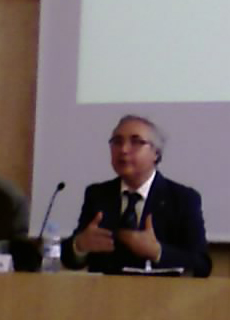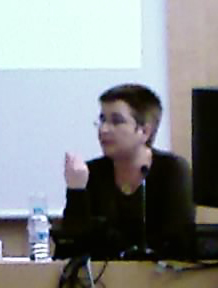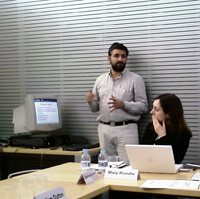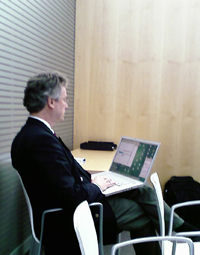By Ismael Peña-López (@ictlogist), 09 March 2007
Main categories: Cyberlaw, governance, rights, e-Government, e-Administration, Politics, Meetings, Participation, Engagement, Use, Activism
2 Comments »
Held at the IN3 headquarters in Castelldefels, Spain, on Friday March 9th, 2007, this open workshop of the MODINIS project, Breaking Barriers to eGovernment, will focus on ways in which innovation can be and has been achieved in eGovernment to improve governance in the information age. How can the widespread diffusion of the Internet and Web enable governments to transform not only the delivery of public services but also approaches to governance? The project has already identified 7 key categories of barriers to the development of eGovernment across Europe. This workshop turns attention to approaches for overcoming these barriers to stimulate innovation. These approaches span at least four key categories: legislative, technological, citizen-centric and organizational solutions.
Here come my notes for the second part of the workshop.
NOTE: concepts in quotation marks that follow refer to the seven key categories of barriers that can block or constrain progress on eGovernment
as stated in the Breaking Barriers to e-Government project.
Innovation in eGovernment: The Use of Geo-information
Sjaak Nouwt, Tilburg Institute for Law Technology and Society (TILT), University of Tilburg, The Netherlands
 Sjaak Nouwt
Sjaak Nouwt
Geo-information: where amb I, what is nearby, how can I go to… Those questions can be answered by Geographic Information Systems (GIS) — fed with professional data for a more professional use — and Location Based Services (LBS) — for a more personal use.
Examples of delivering e-Government via SMS (to specific locations or specifically located people): group SMS messages, SMS bomb, SMS-Cell Broadcast, SMS consultation, SMS prize draw, SMS Alert.
Technologies used to generate location information: Radio Frequency Identification (RFID), mobile communication networks (GSM, UMTS), biometrics, Machine Readable Travel Documents (MRTD, such as the electronic passport), Automated Teller Machines (ATM), Global Positioning System (GPS) or Galileo, optical object recognition.
Legal aspects: privacy law (protection of personal data, processing of location data, retention of traffic data), criminal law and criminal procedure, government information law, employment law, electronic commerce.
Organizational aspects (of sending SMS): inform others (“poor coordination”), choose appropriate topics (“lack of trust”), quick responds (“workplace and organizational inflexibility”), staf skills (“leadership failures”, “poor coordination”), resources (“financial inhibitors”), publicity.
Social aspects: digital divide (“digital divides and choices”), involvement of citizens, make citizens important (“lack of trust”), improve social safety, surveillance.
Online Job Search in the EU: The potential of Web 2.0
Rebecca Eynon, Oxford Internet Institute (OII), University of Oxford, UK
 Rebecca Eynon
Rebecca Eynon
Features of online job search: for job seekers, easy to find vacancies with additional guidance, with facilities to post CVs; for employers, facility to publish and manage job vacancies.
We do have stats about job search pages use, but they are not segregated and cannot know if people use public or commercial sites and if they use it to search or to apply for a job. On the other hand, while the use of those sites among the “employed+unemployed” category is more or less the same between countries (ranging from 20 to 30%), among the “unemployed” category the range varies a lot and goes from 40 to almost 90%, depending on countries.
Barriers to e-Government: Major competition from the private sector (“poor coordination”), public sites tend to be unimaginative and need to innovate (“workplace and organizational inflexibility”), costs of providing online search (“financial inhibitors”)
Potential solutions: co-operation with private sector, encouragement from central eGovernment
Web 2.0 applications are in general absent from e-Government, a major cause of public sector falling behind the private sector.
Workshop. Fostering Innovation in eGovernment (2007)
By Ismael Peña-López (@ictlogist), 09 March 2007
Main categories: Cyberlaw, governance, rights, e-Government, e-Administration, Politics, Meetings, Participation, Engagement, Use, Activism
3 Comments »
Held at the IN3 headquarters in Castelldefels, Spain, on Friday March 9th, 2007, this open workshop of the MODINIS project, Breaking Barriers to eGovernment, will focus on ways in which innovation can be and has been achieved in eGovernment to improve governance in the information age. How can the widespread diffusion of the Internet and Web enable governments to transform not only the delivery of public services but also approaches to governance? The project has already identified 7 key categories of barriers to the development of eGovernment across Europe. This workshop turns attention to approaches for overcoming these barriers to stimulate innovation. These approaches span at least four key categories: legislative, technological, citizen-centric and organizational solutions.
Here come my notes for the first part of the workshop.
Innovation in a Networked Society
Manuel Castells, Universitat Oberta de Catalunya y University of Southern California, USA
 Manuel Castells
Manuel Castells
In the whole world there has been a deep evolution of power. At the international level, nation-states and international institutions do have to establish a new process of decision making that relies on the different stages of Administration (i.e. national vs. supranational), the powers of multinational corporations, NGOs (which Castells calls “new governmental organizations”, as most of them are subsidized by governments), etc. In the case of the European Union, the change is even more explicit due to the different treaties of the Union.
Thus, the centralized administrations of nation-states, have to set network channels to interact at both with sub-levels of public administration and with supranational levels of administration and international coordinating agencies.
The keys for success of e-Government are:
- Databases: The heart of network e-Government. Accessible and inter operable.
- Software: Customized applications. Inter operable, based on standards.
- New rules for administration relationships, fostering horizontal relationships among administrations. The network state requires a network administration which requires network technologies.
- Transparency: Every transaction should directly to an accessible, public record. And the more the transparency, the more (citizenship) participation. And the more transparency, the less corruption.
Some of the most important barriers for e-Government are:
Information, and possibility of access in an interactive way, is a pre-requisite for citizen participation. The state of things now is that it seems there is an ongoing process of administration networking among administrations, but not with citizens, besides one-way information systems.
Regarding technology itself, the problem is that lack of competence makes that the users (administrations) are not setting their IT strategies but tech providers. The Administration should have the autonomous capacity to choose and decide their best tech strategy.
Hierarchical organizations is yet another barrier. Based on asymmetrical information, uncertainty areas emerge and, hence, networks based on power over those areas of uncertainty appear. Notwithstanding, this structure does not fit with the technological structure of of records and data, that, by definition, reduce uncertainty. Resistance to lose power in one’s area of uncertainty is clearly a barrier for IT and network technologies spreading.
In the same way, the transparency that network technologies bring might be a menace for those not interested in having all their acts that much exposed.
Efficiency of the network administration sometimes contradicts autonomy for quick, onsite decisions. Efficiency is based on protocols, that cut autonomy. But flexibility helps autonomy. So the conflict is served.
Labour have to be skilled in digital technologies. But not just digital literacy, but also new processes of organization due to technological change. And most times, unions react against changes if those changes do not take into account workers’ rights.
Lack of interest and knowledge of the organization leaders. Without leadership, there’s no chance to overcome obstacles. And the problems are that (a) leaders don’t know and (b) leaders don’t trust the ones who know, because they don’t think this is that important
Bureaucracies are reluctant to risk, which is a must for innovation.
Innovation does require cultural, organizational and technological change are the fundamental pieces to begin change. Leadership, supported by participation of workers and users, is the way to fit goals with means. If bureaucracy is defined as the organization whose means are the goals (i.e. their goal is to keep the means, is to be a mean), here we have the main contradiction to solve. Bureaucracies should become innovative/schumpeterian bureaucracies.
Innovation in eGovernment in Catalonia
Marta Continente, Generalitat de Catalunya
The transformation of the Administration should be based on changing the demand, on knowing what the citizens ask the Administration.
 Marta Continente
Marta Continente
Three strategies that the catalan government is working in:
- Orientation to the citizen, multiplatform.
- Standardization, but with flexibility
- Decentralization, approaching the citizenship through subsidiarity.
Proximity should be a driver of the relationship amongst the Administration and citizenship. This means that the Administration should serve the citizen specially when he is not connected, but “on the street”. The territory is, hence, a very important variable when designing public services.
If we look at the stats, a high percentage of people search the Internet for information (including public information on public services) but, when asked about their how they’d like their relationship with the Administration, almost a 50% of them do want to go to the nearest office in their town. So, if we thing about going virtual, maybe we’d gain a couple of points to those stats, but we could be leaving behind half the citizenship.
The future of the Administration should be to provide “structural” data that the citizen can easily access, not only to perform tasks with the Administration itself, but to be able to comfortably “move” along the territory.
And along with the idea of participation, Web 2.0 is another of the priorities of Public Administration, letting the user — and this includes both the public servants and the citizens — fill in the public databases and apps with their own, collective, social information.
All in all, the big challenge is to be able to reinvent yourself every morning but keeping a global long term strategy. And this have to fit with your commitment with flexibility. All the actions, of course, have to be accompanied with changes in the regulation framework, and this does not only mean “the law” but all the existing applications that were not interrelated and now have to be.
Workshop. Fostering Innovation in eGovernment (2007)
By Ismael Peña-López (@ictlogist), 08 March 2007
Main categories: e-Government, e-Administration, Politics, Meetings
1 Comment »
On Thursday March 8th, 2007, a workshop on e-Government is taking place at the IN3 headquarters in Castelldefels, Spain, among researchers from the Oxford Internet Institute and the Internet Interdisciplinary Institute. Here come my notes for the second part of the workshop:
eLearning, Copyright
Julià Minguillón, IN3 vice director, begins the session speaking about e-Learning research at UOC, both a goal and a process at the same time
in our University.
Raquel Xalabarder introduces UOC’s projects on Intellectual Property Rights: whose is the ownership of works created in the University, what kind of use can be done of copyrighted material, what are the exceptions (i.e. fair use, educational uses). In her opinion open licensing is not a good solution as, in fact, what it does is not opening but putting more content under copyright: what should be done is to allow more (fair) uses by changing the law and letting out of copyright more and more works. In this aspect, the role of libraries would be crucial in spreading knowledge and content.
 Julià Miniguillón and Rebecca Eynon
Julià Miniguillón and Rebecca Eynon
Regarding Open Educational Resources, UOC’s UNESCO Chair is supposed to be the place where all the research in the field should meet and be fostered. In this line, Rebecca Eynon talks about informal learning and how networking can be driven towards e-science, how people talk to computers
and what they do with them in terms of (self)learning. In Minguillón’s words, knowing our students, building a profile for them should be the first steps to personalize the teaching we want for them, customizing the one learning path to different learning paths according to the preferences and background of the students
.
Bill Duton says that the OII is deep into e-Science and Open Science, specially the ethical aspects of Open Science, confidentiality and so on. Authorship is another delicate issue in the field of Open Science or Open Educational Materials. Actually, the boundaries between e-Learning and e-Science are blurring.
Political parties, political participation
Albert Batlle and Ana Sofía Cardenal explain their research on political parties’ organization and political parties’ use of ICTs. One important side effect of this research is to discover the level of (cyber)activism around a political party and, depending of the degree of activism, try and see how ICTs are affecting the connection with this activism and how it determines the degree of (de)centralization of the party’s structure.
Rosa Borge, along with Clèlia Colombo, is analyzing experiences of (ICT mediated) political participation, and see how this participation changes according to the intensity of ICT use. Also, how municipalities are organized depending on the use of ICTs.
Steven Ward focuses on electoral campaigning and how parties use technologies to raise activism, to self-organize, etc. with special emphasis on how those technologies change the (pyramidal) relationship among the top direction of the party and the members and sympathizers. A good point is whether people are “activated” online or are contacted online after “activation”. Another point is how ICTs can improve the experience of collaborating with one party.
Bill Dutton puts the example of smartmobs and how researchers aiming to understand those movements should set up “firefight research headquarters” that could move quickly and study the target from within, on site.
Ward says that, notwithstanding, it looks like despite technology incredibly easing being connected one to each other and with the party, engagement with the party lasts less and less over time, and citizens just gather around projects or punctual campaigns, but not identify themselves with the party’s ideology nor with the party itself. I compare his statement with some findings of my research on e-Learning for Development, where there actually were some smartmob-like online volunteers that joined specific campaigns — what I called “Type I: Online Advocacy” volunteers — but there were also long term online volunteers — “Type IV: Pure Online Volunteers” — that were deeply identified with the way the NGO worked and even lasted, in their collaboration, longer than onsite volunteers. Thus, the problem might not be with technology/ies but with the parties themselves.
eGovernment indicators
To close the session, Ana Waksberg Guerrini says there’s a lack of a “network government” definition and how governments are transitioning from the bureaucratic, analogue form of organization to a more networked, digital one. It’s all closely related with efficiency, efficacy, public service. Are Administrations (net)working around projects the way the public sector does when it cooperates? Or they just stay within departments? How do we measure this?
OII-IN3 Workshop on e-Government (2007)
By Ismael Peña-López (@ictlogist), 08 March 2007
Main categories: e-Government, e-Administration, Politics, Meetings
3 Comments »
On Thursday March 8th, 2007, a workshop on e-Government is taking place at the IN3 headquarters in Castelldefels, Spain, among researchers from the Oxford Internet Institute and the Internet Interdisciplinary Institute. Here come my notes for the first part of the workshop:
Network Societies
Eduard Aibar, UOC‘s vicerector of research, presents the Households branch of the Internet Catalonia Project.
Bill Dutton then presents their research, focusing in a couple of aspects. The first one, is the huge interest in the digital divide, related to the economic divide, a great barrier for any enhancement or fostering of the Information Society anywhere. The second one is what he/they [at the OII] call the digital choice: a lot of people choose not to use the Internet, even if they could, because they’re not interested in it, it just does not add value to them. It looks like it is really related to age to stand in the analogue paradigm/world.
 Bill Dutton
Bill Dutton
Dutton then goes to the issue on how the Internet is affecting our social skills and relationships. He states that when using online media you reshape your [physical] network and get to know and relate to people that, otherwise, you (surely never) would never ever meet.
One of the points Dutton puts more stress in is in trying to change — or, at least, influence — the work of policy makers, in the shape of policy guidelines or recommendations. On the one hand, public funds pay most of the research they’re doing, so trying to influence the public sphere becomes sort of a payback for this funding. On the other hand, putting it to practice is a means to see how research is connected to reality and what exactly is its use.
eGovernment, eJustice
Agustí Cerrillo speaks about e-Government as not the automating of the Administration, but a deeper change. In this line, the actual legal [public] framework in Spain does not really provide a good environment to innovate in this subject, though there are plenty initiatives in the field. And even if the legal framework is being adapted to e-Administration/e-Government — by publishing new e-Government laws —, the day-to-day reality in the Administration is not being changed that much.
Research in public information and electronic access to this information by the citizens is a key issue, in three aspects:
- Use and diffusion of public information, and also the reuse of this public information
- Dangers and damages that public information can cause: quality of public information, use and misuse of this information for good/bad purposes
- Public sector information accessibility, that should be universally available online
Pere Fabra then talks about e-Justice and the research and report on e-Justice in Latin America carried on last year [the full report can be downloaded here ( , 4.69 Mb)]. For Fabra, the best output was not the data raised by the research but the (new) methodology created to do the research, a relatively virgin field that requires further work to obtain accurate indicators and means to measure the state of e-Justice. One of the best findings was that leadership was really crucial in the fostering of e-Justice strategies and projects, hence this was one of the most stressed recommendations when the report was presented, that any initiative in this field should begin with a good leadership design.
, 4.69 Mb)]. For Fabra, the best output was not the data raised by the research but the (new) methodology created to do the research, a relatively virgin field that requires further work to obtain accurate indicators and means to measure the state of e-Justice. One of the best findings was that leadership was really crucial in the fostering of e-Justice strategies and projects, hence this was one of the most stressed recommendations when the report was presented, that any initiative in this field should begin with a good leadership design.
Bill Dutton and Rebecca Eynon introduce some more projects in this same area of knowledge, among them Government on the Web — dedicated to improving knowledge and understanding of e-government and the impact of web-based technologies on government
— and Network Democracy 2.0.
During the debate, it is stressed the point that e-Administration or e-Government usually focus on the executive power but usually forget the legislative power. It might be a matter of efficiency, in the sense that Government action is more likely to be evaluated, changed or enhanced, but it might also be that the legislative power is less prone to change and it deals with more “delicate” issues for the citizenship itself, so “it better remain untouched” before avant-garde ideas settle down and prove their goodness.
About public information in the Internet, it’s weird to realize that most people will say that they are not interested in public sector information or Administration websites, but they do search the Internet for Health or Education information and, most times, they end up reading Public Administration websites, either being aware of if but either being not, i.e. searching and finding in Google what they’d never search or even find in the Government website. Thus, research in this field of public information and public services should be reshaped to really get the relevant data despite what the citizen wants to say about what he does or about what he think he does.
OII-IN3 Workshop on e-Government (2007)
By Ismael Peña-López (@ictlogist), 25 January 2007
Main categories: Cyberlaw, governance, rights, e-Government, e-Administration, Politics, Participation, Engagement, Use, Activism, Writings
1 Comment »
I’m proud to announce the launching of the new Master in e-Administration (link in Spanish) by the Open University of Catalonia [Barcelona, Spain], in which I am both author and teacher of the first part devoted to the technological ground of electronic Administration.
The structure of the master is as follows:
- Technological grounds of the e-Administration
- Juridical grounds of the e-Administration
- Politic and organizational grounds of the e-Administration
- e-Administration design, implementation and evaluation
- ICT applications in the public framework
- Analysis of the e-Administration
The master (actually, a one year post-degree) is directed by Dr. Agustí Cerrillo, expert in e-Administration and e-Governance, and begins in March 2007. There’s the option to follow two consecutive one-semester post-degrees too.
By Ismael Peña-López (@ictlogist), 07 October 2006
Main categories: e-Government, e-Administration, Politics, e-Readiness, Writings
2 Comments »
As an output of the XIII Cumbre Judicial Iberoamericana [XIII Latin American Summit on Justice], some researchers produced a report on the state of e-Justice in the 22 countries members of the summit.
After a first draft, now the report has officially been released. The researchers taking part in the report team are Pere Fabra (who coordinated), Albert Batlle, Agustí Cerrillo, Antoni Galiano, Ismael Peña-López (myself ;) and Clèlia Colombo.
If you can read Spanish (you should ;) I strongly recommend its reading, not because I’m one of the authors but because it goes deep into what I think is still an unexplored issue of both the Information Society and the area of Justice administration, the e-Justice index on of its most interesting contributions.







 , 4.69 Mb)
, 4.69 Mb)